Stop leaving rail ticket barriers open, says minister, as fare evasion bill hits £240m a year

The Government is to clamp down on the number of ticket barriers being left open to tackle fare evasion on the railways, The Telegraph can reveal.
Fare dodgers cost the taxpayer £240 million a year, according to Huw Merriman, the newly-appointed rail minister.
He warned that continuing fare evasion could jeopardise future rail investment.
“For the barriers to be left open would be bad enough in the days when things were better,” Mr Merriman told MPs and rail officials last week.
“To do so when I am fighting so hard with the Treasury to justify all the investment we’re being given is madness.”
Mr Merriman showed a photograph he claimed he had taken of barriers left open at 11pm on a Saturday night at London Bridge station.
“On Saturdays demand for travel is at 115 per cent of pre-Covid levels of passengers travelling, so we need to be collecting the revenue,” he said.
“I had a conversation with the parent operators of the TOCs [train operating companies] and we talked about the need to really take action and ensure the barriers are manned and closed and we have people onboard trains checking tickets.”

A staff sheet for gateline barrier staff based at the station last Friday seen by The Telegraph showed 14 people were rostered to look after barriers all day, with the main gates not having any staff present after 2pm. The document said the plan was subject to “all the staff being available. If we have staff shortages, we might need to swap people around.”
Mr Merriman – who is MP for Bexhill and Battle in East Sussex and until his appointment last month chaired the Transport Select Committee - added the rail industry “needs to tighten up to ensure the penalties are steeper so those who don’t pay - and expect the rest of us to pay because there’s a revenue shortfall and someone has to make up for it – get penalised.”
While he said tailgating – whereby someone follows closely behind a passenger without putting a ticket through the barriers – “drives me absolutely mad”, he acknowledged rail staff are often powerless as “you would have to be a brave person to stop the type of person that does that kind of thing”.
He also warned that he “he can’t just pretend fare evasion isn’t happening” expressing a fear that if it continues future rail investment plans could be jeopardised.
In the Autumn Statement, Jeremy Hunt, the Chancellor, confirmed that the core £17 billion Northern Powerhouse Rail project would go ahead - a watered-down version of the original £43bn upgrade, which would have seen high-speed trains stop at Bradford.
The controversial HS2 rail link from Birmingham to Manchester was also included. Research seen by The Telegraph found that the £26 billion initial estimate for this leg of the project is likely to reach almost £40 billion by 2040.
‘Nobody is checking tickets’
The most recent data available from the Office for Rail and Road showed that rail industry spending topped £21 billion in 2020-21.
Mr Merriman vowed not to reduce the number of ticket inspectors to cut costs. While the Treasury bears the ultimate responsibility for revenue, he claimed it is his duty as rail minister to bring in money.
“As far as I’m concerned, I own the revenue because ultimately, I know that if we don’t get the revenue in, the Treasury won’t give us the money to fund the projects we need,” he said.
“I could say ‘I look after the costs, so therefore I’m going to reduce the costs and reduce the number of people that check tickets’, but then someone else finds there’s a reduction in revenue because nobody is checking tickets. That’s madness and that’s not going to be happening.”
A spokesman for the Rail Delivery Group said: “Fare dodging is simply unfair because it means less money to invest in improving services or keeping fares down for all our customers. It is unfortunate that very occasionally an unexpected shortage of staff can mean that gates at some stations are left open for safety reasons.”
Network Rail – which manages London Bridge station – declined to comment, as did the Department for Transport, when approached by The Telegraph.

 Yahoo Movies
Yahoo Movies 